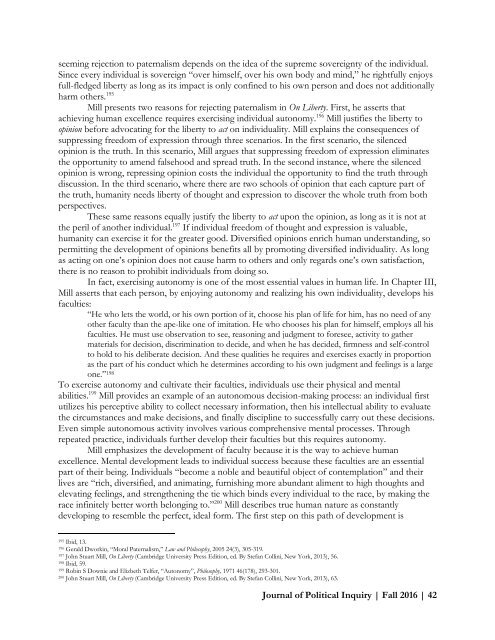Fall2016_Final
Create successful ePaper yourself
Turn your PDF publications into a flip-book with our unique Google optimized e-Paper software.
seeming rejection to paternalism depends on the idea of the supreme sovereignty of the individual.<br />
Since every individual is sovereign “over himself, over his own body and mind,” he rightfully enjoys<br />
full-fledged liberty as long as its impact is only confined to his own person and does not additionally<br />
harm others. 195<br />
Mill presents two reasons for rejecting paternalism in On Liberty. First, he asserts that<br />
achieving human excellence requires exercising individual autonomy. 196 Mill justifies the liberty to<br />
opinion before advocating for the liberty to act on individuality. Mill explains the consequences of<br />
suppressing freedom of expression through three scenarios. In the first scenario, the silenced<br />
opinion is the truth. In this scenario, Mill argues that suppressing freedom of expression eliminates<br />
the opportunity to amend falsehood and spread truth. In the second instance, where the silenced<br />
opinion is wrong, repressing opinion costs the individual the opportunity to find the truth through<br />
discussion. In the third scenario, where there are two schools of opinion that each capture part of<br />
the truth, humanity needs liberty of thought and expression to discover the whole truth from both<br />
perspectives.<br />
These same reasons equally justify the liberty to act upon the opinion, as long as it is not at<br />
the peril of another individual. 197 If individual freedom of thought and expression is valuable,<br />
humanity can exercise it for the greater good. Diversified opinions enrich human understanding, so<br />
permitting the development of opinions benefits all by promoting diversified individuality. As long<br />
as acting on one’s opinion does not cause harm to others and only regards one’s own satisfaction,<br />
there is no reason to prohibit individuals from doing so.<br />
In fact, exercising autonomy is one of the most essential values in human life. In Chapter III,<br />
Mill asserts that each person, by enjoying autonomy and realizing his own individuality, develops his<br />
faculties:<br />
“He who lets the world, or his own portion of it, choose his plan of life for him, has no need of any<br />
other faculty than the ape-like one of imitation. He who chooses his plan for himself, employs all his<br />
faculties. He must use observation to see, reasoning and judgment to foresee, activity to gather<br />
materials for decision, discrimination to decide, and when he has decided, firmness and self-control<br />
to hold to his deliberate decision. And these qualities he requires and exercises exactly in proportion<br />
as the part of his conduct which he determines according to his own judgment and feelings is a large<br />
one.” 198<br />
To exercise autonomy and cultivate their faculties, individuals use their physical and mental<br />
abilities. 199 Mill provides an example of an autonomous decision-making process: an individual first<br />
utilizes his perceptive ability to collect necessary information, then his intellectual ability to evaluate<br />
the circumstances and make decisions, and finally discipline to successfully carry out these decisions.<br />
Even simple autonomous activity involves various comprehensive mental processes. Through<br />
repeated practice, individuals further develop their faculties but this requires autonomy.<br />
Mill emphasizes the development of faculty because it is the way to achieve human<br />
excellence. Mental development leads to individual success because these faculties are an essential<br />
part of their being. Individuals “become a noble and beautiful object of contemplation” and their<br />
lives are “rich, diversified, and animating, furnishing more abundant aliment to high thoughts and<br />
elevating feelings, and strengthening the tie which binds every individual to the race, by making the<br />
race infinitely better worth belonging to.” 200 Mill describes true human nature as constantly<br />
developing to resemble the perfect, ideal form. The first step on this path of development is<br />
195<br />
Ibid, 13.<br />
196<br />
Gerald Dworkin, “Moral Paternalism,” Law and Philosophy, 2005 24(3), 305-319.<br />
197<br />
John Stuart Mill, On Liberty (Cambridge University Press Edition, ed. By Stefan Collini, New York, 2013), 56.<br />
198<br />
Ibid, 59.<br />
199<br />
Robin S Downie and Elizbeth Telfer, “Autonomy”, Philosophy, 1971 46(178), 293-301.<br />
200<br />
John Stuart Mill, On Liberty (Cambridge University Press Edition, ed. By Stefan Collini, New York, 2013), 63.<br />
Journal of Political Inquiry | Fall 2016 | 42
















